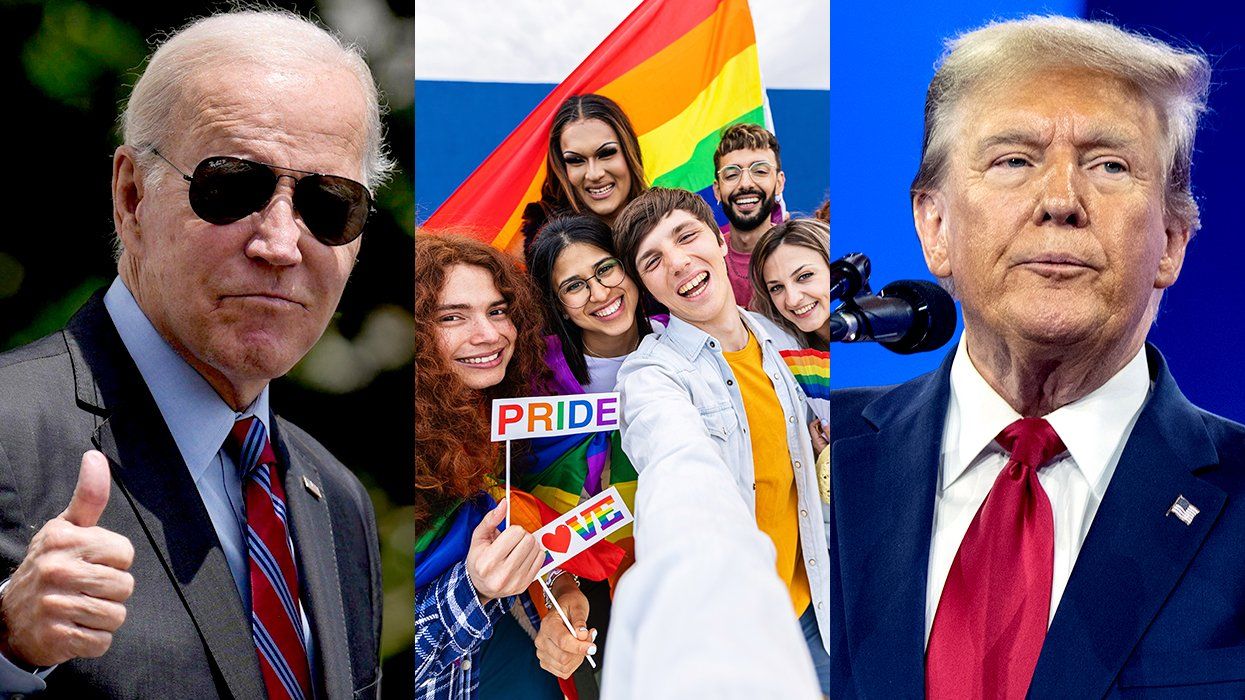The
Human Rights Campaign is out with a new report that lays bare the dramatic differences in how federal agencies approached LGBTQ+ rights under the administrations of former President Donald Trump and President Joe Biden. The comprehensive analysis released on Friday provides a critical look at the policies that have shaped the lives of LGBTQ+ people over the past several years. It reveals that under Biden the LGBTQ+ community is faring much better than under Trump.
“The analysis makes clear what we have seen across the country,” said HRC President Kelley Robinson in a statement. “Actions have consequences. Time and again, the Trump Administration ushered in policies and positions that did damage to LGBTQ+ lives. Meanwhile, in their first term, the Biden-Harris Administration has taken steps to make our lives better. Federal agencies take actions that impact nearly every aspect of our lives. And Americans deserve a government that steps up to defend freedom and equality for all.”
The report meticulously categorizes the actions of both administrations into four key areas: nondiscrimination protections, data collection, services and resources, and inclusive policies.
Nondiscrimination protections
Under Trump, the rollback of LGBTQ+ rights was relentless, according to the report. Agencies systematically rescinded rules and guidance that had previously affirmed legal protections for
LGBTQ+ people. The report notes that civil rights complaints based on sexual orientation or gender identity were largely dismissed, and inclusive policies were replaced with exclusionary ones. For instance, in 2017, the Department of Education and the Department of Justice withdrew guidance that protected transgender students’ rights under Title IX. Additionally, the Department of Health and Human Services issued a rule in 2020 removing explicit protections in health care for LGBTQ+ people under Section 1557 of the Affordable Care Act.
In stark contrast, the Biden administration has worked diligently to restore and expand protections for LGBTQ+ people, HRC reports. Following the pivotal U.S. Supreme Court decision in
Bostock v. Clayton County in June 2020, federal agencies under Biden have moved to ensure that LGBTQ+ people are protected from discrimination under existing sex discrimination laws. The landmark ruling held that Title VII of the Civil Rights Act of 1964, which prohibits discrimination “because of sex,” includes discrimination based on sexual orientation and gender identity. In 2021, HHS announced that it would interpret and enforce Section 1557 and Title IX’s prohibitions on discrimination, including discrimination based on sexual orientation and gender identity.
“Across the country, LGBTQ+ people are living through an unprecedented state of emergency,” explained HRC senior legislative counsel Luis A. Vasquez. “The federal government, through its administrative agencies, is uniquely equipped to respond to this reality and step up to protect LGBTQ+ people, including through enforcing existing federal laws that can counter devastating anti-LGBTQ+ laws and policies spreading throughout the country.”
Data collection
The report also highlights a critical difference in data collection efforts. Under Trump, efforts to gather data on the LGBTQ+ community were halted, leaving a void in understanding and addressing their needs, the report’s authors write. The Department of Housing and Urban Development proposed withdrawing a survey intended to assess LGBTQ+ youth homelessness prevention initiatives.
Biden’s administration has reversed this trend, reinstating and expanding data collection to ensure that LGBTQ+ people are visible and their needs are met in policy decisions. In 2022, the Census Bureau added questions on sexual orientation and gender identity to the Household Pulse Survey to assess the pandemic’s impact on LGBTQ+ communities. The restored data collection allows for the generation of crucial information that influences federal funding allocations and policy decisions, ensuring that LGBTQ+ people are adequately represented, according to the report.
Services and resources
When it comes to services and resources, the Trump administration’s policies aimed to erase transgender individuals from government programs and restrict their access to essential services. In 2018, the Department of Defense instated a ban on transgender people serving openly in the
military. The Trump administration also worked to cut off LGBTQ+ people’s access to government-funded programs and services, including family planning services.
While acknowledging that some gaps remain, the report states that the Biden administration has significantly expanded the availability of these programs to include LGBTQ+ people explicitly. In 2021, the Department of Defense reversed the ban on transgender people serving in the military, allowing them to serve openly and access gender-affirming medical care. However, some federal resources remain unavailable to LGBTQ+ people, such as consistent access to PrEP and other HIV prevention tools for incarcerated criminals and surgical benefits for transgender veterans seeking gender-affirming care.
Inclusive policies
The promotion of inclusive policies further highlights the contrast between the two administrations. According to the report, Trump’s approach was to eliminate references to LGBTQ+ people, allowing discrimination to go unchecked. For instance, the Department of Labor finalized a rule in 2019 allowing federal contractors to cite religious objections as a basis for employment discrimination against LGBTQ+ community members.
Biden’s administration has worked to restore and expand inclusive policies, directing covered entities to promote inclusion for LGBTQ+ people. This includes filling key government positions with advocates for LGBTQ+ rights and ensuring that federal guidance promotes equity and equality. In 2021, the Department of Labor rescinded the rule that allowed federal contractors to discriminate based on religious beliefs.
The road ahead
Other notable examples in the report include the Trump administration’s actions to prioritize religious liberty over LGBTQ+ rights, such as creating a new division within HHS to protect
health workers who refuse to provide services based on religious beliefs, which critics argue allowed for discrimination against LGBTQ+ patients. Meanwhile, the Biden administration has focused on reversing such policies, including reinforcing nondiscrimination protections in health care.
“We prepared this research to give the public a clear assessment on the impact of agencies under both administrations on LGBTQ+ people – and provide insight on what future administrative actions could be taken to advance or even undermine equality,” Vasquez said.





































































Charlie Kirk DID say stoning gay people was the 'perfect law' — and these other heinous quotes